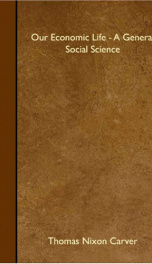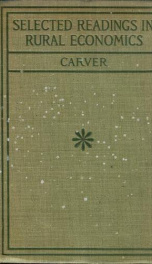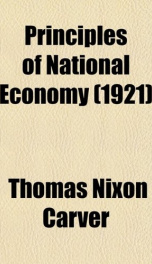our economic life a general social science

INTRODUCTION Throughout the centuries man has been progressingmore and more rapidly since the time of the Industrial Revolution. Large-scale production has given us powerful slaves in the form of machinery, but has made us almost completely. dependent upon the machine, our life work and our means of enjoyment alike conditioned by its use. Division of labor has been the natural consequence of the establishment of the machine era, and as such division has grown more and more minute our dependence upon one another has become correspondingly greater. There are certain laws and forces continually at work in this complex life of ours, and many of us do not realize that they even exist. An American banker has said that the American people are economic illiteratesJ-that we do not know the ABCs of the business world in which we live. Social problems resulting from our more complex lives are growing up more rapidly than we are able to solve them, while the corruption so often found in politics bears mute testimony to our ignorance of, or indifference to, those underlying political principles upon which all good government must be based. This book does not pretend to give a complete exposition of the economic, sociological, and political principles underlying our group life. But it does try to give a basis upon which the boys and girls may build a better understanding of such sciences from their own activities and from the information which they glean from books, magazines, and newspapers. Furthermore, it attempts to give them some standards by which they may evaluate the everyday occurrences of their everyday lives, and some appreciation of their share in the preservation and development of the group life, iii iv INTRODUCTION In choosing cartoons as the illustrations for this book, the authors were influenced by the tremendous influence that the cartoon wields in our social and economic life, and by the fact that so many of us form our opinions on many vital subjects from the quickly grasped lesson of the cartoon. But we must remember that the cartoon is an expression of the personal opinion of the artist or of the publication that employs him. Like the editorial, it should never be accepted uncritically it should make us think, but we should weigh its message. The authors acknowledge with much appreciation the painstaking cooperation of Mr. Victor Guinness and Mr. Jack Gallagher, who made the original cartoons, and the personal interest and help of Colliers, The Saturday Evening Post, Mr. Herbert Johnson, Mr. J. N. Darling, Mr. F. E. Opper, Mr. John Cassel, and the many periodicals and cadoonists who have permitted them to show here these typical American cartoons. The authors wish to acknowledge above all their indebtedness to Dr. J. Lynn Barnard, of Ursinus College. It was at Dr. Barnards suggestion that the authors undertook the work. Moreover, throughout the six years during which OUR ECONOMI L C IF E has been in process of writing, Dr. Barnard has given generously of his time, his interest, and his wide knowledge to make the book valuable, and if the book proves valuable, much of the credit should go to him...
Info about the book
Author:
Series:
Unknown
ASIN:
B000RC4BA6
Rating:
3/5 (2)Your rating:
0/5
Languge:
English
Users who have this book
Users who want this book
What readers are saying
What do you think? Write your own comment on this book!
write a commentGenre
if you like our economic life a general social science try:
Do you want to exchange books? It’s EASY!
Get registered and find other users who want to give their favourite books to good hands!








